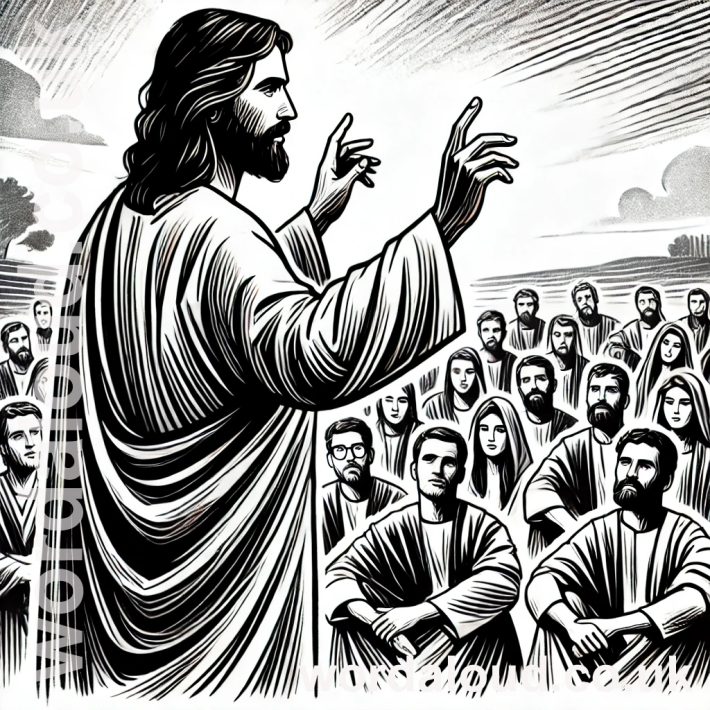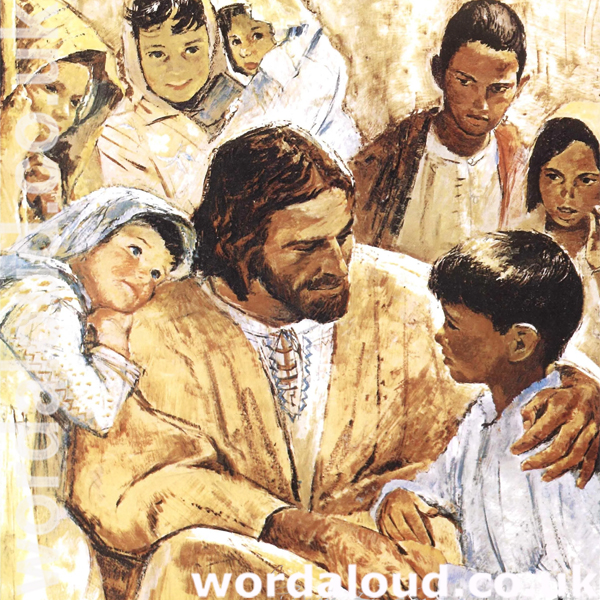Christian Art | Jesus Christ Preaches To His Disciples | Love Revealed By Jesus Christ
Office Of Readings | Week 20, Sunday, Ordinary Time | A Reading From The Homilies Of Saint John Chrysostom On Saint Matthew’s Gospel | Salt Of The Earth And Light Of The World
‘Salt of the earth and light of the world.’
When Saint John Chrysostom interprets the words ‘You are the salt of the earth,’ he sets the task of the disciples in contrast to the prophets of Israel. Whereas the prophets were sent to particular peoples, Christ now sends his followers to all nations. The scope is universal: not one city or one country, but the world in its entirety. By calling them salt, Christ indicates the condition of humankind before his coming. Humanity, in Chrysostom’s description, had ‘lost its savour’ through sin, much as meat without salt becomes liable to decay. Christ alone restores what had become corrupt; the disciples are then charged with preserving this restored creation, preventing the return of corruption through their labour and teaching.
Chrysostom also notes the quality of life required for such a mission. Salt preserves what is good by checking the spread of what destroys. So the disciples must display virtues that restrain harm and protect the common good: mercy, justice, modesty, peace-making, and purity of heart. Their role is not limited to personal conduct; they are given responsibility for others. A virtuous life is not hidden or private but benefits the community, much as salt works not for itself but for the food it seasons.
The warning that salt may lose its savour is treated with seriousness. If the disciples neglect their task, they not only fail themselves but endanger those entrusted to them. Salt without flavour is thrown out and trampled underfoot, and Chrysostom applies this to ministers who, if they fall away, draw others down with them. The passage thus sets a standard of vigilance.
Jesus Christ then shifts the image to light: ‘You are the light of the world.’ Chrysostom notes the progression. Salt prevents corruption, but light gives guidance and vision. Again, the commission extends beyond one people to the whole world. Light here is not physical but intelligible: teaching that clarifies, instruction that directs, example that illumines. Just as salt operates unseen within food, light is visible and public. Together the two metaphors suggest both preservation and illumination, both restraint of evil and encouragement of good.
Chrysostom draws attention to Christ’s insistence that light cannot be hidden. A city on a hill or a lamp on a stand is exposed to view. So the disciples live their lives in public, before the eyes of the nations. Their manner of life and their teaching cannot be concealed. Persecution, curses, and slander will come, yet these are not marks of failure but of fidelity. To falter through fear would bring dishonour, for the loss of saltiness or the concealment of light leads others astray.
The homily thus presents a double charge: to preserve what Christ has renewed and to illumine the world through conduct and teaching. The apostles are cast as successors to the prophets yet with a wider field, bearing a responsibility that extends to every people. In Chrysostom’s exposition, the mission of the Church is shaped by these metaphors: to resist decay by virtue and to direct others by truth.

A Reading From The Homilies Of Saint John Chrysostom On Saint Matthew’s Gospel | Salt Of The Earth And Light Of The World
You are the salt of the earth. It is not for your own sake, he says, but for the world’s sake that the word is entrusted to you. I am not sending you only into two cities or only into ten or twenty, not to a single nation, as I sent the prophets of old, but across land and sea, to the whole world. And that world is in a miserable state. For when he says: You are the salt of the earth, he is indicating that all mankind had lost its savour and had been corrupted by sin. Therefore, he requires of these men those virtues which are especially useful and even necessary if they are to bear the burdens of many. For the man who is kindly, modest, merciful and just will not keep his good works to himself but will see to it that these admirable fountains send out their streams for the good of others. Again, the man who is clean of heart, a peacemaker and ardent for truth will order his life so as to contribute to the common good.
Do not think, he says, that you are destined for easy struggles or unimportant tasks. You are the salt of the earth. What do these words imply? Did the disciples restore what had already turned rotten? Not at all. Salt cannot help what is already corrupted. That is not what they did. But what had first been renewed and freed from corruption and then turned over to them, they salted and preserved in the newness the Lord had bestowed. It took the power of Christ to free men from the corruption caused by sin; it was the task of the apostles through strenuous labour to keep that corruption from returning.
Have you noticed how, bit by bit, Christ shows them to be superior to the prophets? He says they are to be teachers not simply for Palestine but for the whole world. Do not be surprised, then, he says, that I address you apart from the others and involve you in such a dangerous enterprise. Consider the numerous and extensive cities, peoples and nations I will be sending you to govern. For this reason I would have you make others prudent, as well as being prudent yourselves. For unless you can do that, you will not be able to sustain even yourselves.
If others lose their savour, then your ministry will help them regain it. But if you yourselves suffer that loss, you will drag others down with you. Therefore, the greater the undertakings put into your hands, the more zealous you must be. For this reason he says: But if the salt becomes tasteless, how can its flavour be restored? It is good for nothing now, but to be thrown out and trampled by men’s feet.
When they hear the words: When they curse you and persecute you and accuse you of every evil, they may be afraid to come forward. Therefore he says: ‘Unless you are prepared for that sort of thing, it is in vain that I have chosen you. Curses shall necessarily be your lot but they shall not harm you and will simply be a testimony to your constancy. If through fear, however, you fail to show the forcefulness your mission demands, your lot will be much worse, for all will speak evil of you and despise you. That is what being trampled by men’s feet means.’
Then he passes on to a more exalted comparison: You are the light of the world. Once again, ‘of the world’: not of one nation or twenty cities, but of the whole world. The light he means is an intelligible light, far superior to the rays of the sun we see, just as the salt is a spiritual salt. First salt, then light, so that you may learn how profitable sharp words may be and how useful serious doctrine. Such teaching holds in check and prevents dissipation; it leads to virtue and sharpens the mind’s eye. A city set on a hill cannot be hidden; nor do men light a lamp and put it under a basket. Here again he is urging them to a careful manner of life and teaching them to be watchful, for they live under the eyes of all and have the whole world for the arena of their struggles.
Christian Prayer With Jesus Christ
Lord Jesus Christ,
you called your disciples to be the salt of the earth and the light of the world.
Preserve us from corruption by your grace,
and let our lives bear the savour of your truth.
Shine through us with the light of your word,
that we may guide others to your kingdom,
and bring glory to the Father,
who lives and reigns with you in the unity of the Holy Spirit,
one God, forever and ever.
Amen.
Glossary Of Christian Terms
Apostles – The first disciples of Jesus, chosen and sent out to preach the Gospel and establish the Church.
Salt of the earth – A metaphor used by Christ (Matthew 5:13) for the preserving and purifying role of his disciples in the world.
Light of the world – A metaphor (Matthew 5:14) for the witness of believers whose lives and teaching make the truth visible to others.
Prophets – In the Old Testament, men and women called by God to speak his word, often to particular peoples or nations.
Persecution – Hostility or suffering endured because of faith in Christ.
City on a hill – An image of visibility and public witness; the life of Christians cannot be hidden but is seen by others.
Lamp on a stand – A figure for Christian teaching and conduct which must shine openly, not concealed.
Corruption – In Chrysostom’s homily, the moral decay caused by sin, which Christ overcomes and the Church must guard against.
Virtues – Habits of moral excellence (such as mercy, justice, humility, peace-making, and purity of heart) that preserve goodness and guide others.
Witness – The act of confessing Christ, both by word and by way of life, even in the face of opposition.








